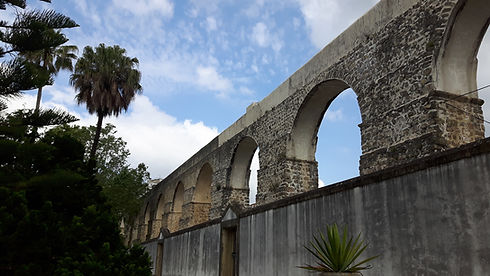
Bellow are listed the curricular units offered during successive study semesters in each institution of the IMAE consortium. It is indicated if the unit is compulsory (C) or elective (E), teaching language English (en) or Portuguese (pt) and the number of ECTS allocated.
Year 1 – 1st semester >> University of Coimbra, Portugal
(October to March)
Students must complete 30 ECTS:
-
Advanced Topics in Applied Ecology (C, en) - 6 ECTS
-
Data analysis in ecology (C, en) - 6 ECTS
-
Field Course in Mediterranean Ecosystems (C, en) - 6 ECTS
-
Evolutionary Biogeography and Spatial Modelling (E, en) - 6 ECTS
-
Field Course in Tropical Ecosystems (E, en) - 6 ECTS
-
Geographic Information Systems and Spatial Modelling (E, en) - 6 ECTS
-
Global Change Ecology and Societal Challenges (E, en) - 6 ECTS
-
Science, history and politics of climate change (E, en) - 6 ECTS
-
Valuing Biological Resources and Ecosystem Services (E, en) - 6 ECTS
The list of options may vary from year to year » new options soon.


Year 1 – 2nd semester >> Kiel University, Germany
(April to July)
Students must complete 30 ECTS:
-
Digital Spatial Analysis - Practical Exercises (E, en) - 6 ECTS
-
Ecosystem Services in Agroecosystems (E, en) - 6 ECTS
-
Fieldtrip Hydrobiology Poland (E, en) - 6 ECTS
-
Integrated Management of Rural-and Woodland Regions (E, en) - 6 ECTS
-
Long Term Development of Landscapes - Field Studies (E, en) - 6 ECTS
-
Management of Soil Resources (E, en) - 6 ECTS
-
Marine and Coastal Ecosystems I (E, en) - 6 ECTS
-
Ocean Economics (E, en) - 6 EC
-
Principles of Sustainability in Space and Time (E, en) - 6 ECTS
The list of options may vary from year to year » new options soon.
Year 2 >> University of Coimbra, Portugal
(September to July)
Students must complete 60 ECTS:
-
Dissertation in Applied Ecology (C, en) - 30 ECTS
-
Laboratory and Field Ecology I (C, en) - 8 ECTS
-
Seminar in Ecology I (C, en) - 4 ECTS
-
Agroecology and Sustainable Food Systems (E, en) - 6 ECTS
-
Aquaculture, Fisheries and Marine Resources Sustainability (E, en) - 6 ECTS
-
Behavioural Ecology (E, en) - 6 ECTS
-
Biological Oceanography (E, en) - 6 ECTS
-
Conservation and Management of Biodiversity (E, en) - 6 ECTS
-
Ecoliteracy (E, en) - 6 ECTS
-
Ecotoxicology and Ecological Risk (E, en) - 6 ECTS
-
Introduction to Marine Policy (E, en) - 6 ECTS
-
Marine Resources and Marine Biotechnology (E, en) - 6 ECTS
-
Population Ecology (E, en) - 6 ECTS
-
Science, history and politics of climate change (E, en) - 6 ECTS
-
Scientific Writing (E, en) - 6 ECTS
The list of options may vary from year to year.


Year 2 >> Kiel University, Germany
(September to July)
Students must complete 60 ECTS:
-
Dissertation (C, en) - 30 ECTS
-
Advanced Analytical Methods in Plant Ecology using R (E, en) - 6 ECTS
-
Conservation Biology (E, en) - 6 ECTS
-
Ecosystems Modelling (E, en) - 6 ECTS
-
Environmental Economics (E, en) - 6 ECTS
-
GIS in Ecology (E, en) - 6 ECTS
-
Integrated Management of River Basins (E, en) - 6 ECTS
-
Integrated Management of Wetlands (E, en) - 6 ECTS
-
Plant x Environmental Interactions (E, en) - 6 ECTS
-
Principles of Environmental Economics & Environmental Planning (E, en) - 6 ECTS
The list of options may vary from year to year.
Year 2 >> University of East-Anglia, Norwich
(September to July)
Students must complete 60 ECTS/180 credits:
-
Dissertation BIO (C, en) - 30 ECTS / 80 credits
-
Evidence based Global Conservation (C, en) - 6 ECTS / 20 credits
-
Statistics and Modelling for Scientists using R (C, en) - 6 ECTS / 20 credits
-
Multivariate Statistics (E, en) - 3 ECTS / 10 credits
-
Univariate Statistics (E, en) - 3 ECTS / 10 credits
-
Evolutionary Biology and Conservation Genetics (E, en) - 3 ECTS / 10 credits
-
Ecological Survey Methods (E, en) - 6 ECTS / 20 credits
-
Practical Conservation and Work Experience (E, en) - 3 ECTS / 10 credits
-
Political Ecology (E, en) - 6 ECTS / 20 credits
-
Modelling Environmental Processes (E, en) - 6 ECTS / 20 credits
-
Climate Change: Physical Science Basis (E, en) - 6 ECTS / 20 credits
-
Sustainable Consumption (E, en) - 6 ECTS / 20 credits
-
Energy and Climate Change (E, en) - 6 ECTS / 20 credits
-
Geoengineering The Climate: Science and Policy (E, en) - 6 ECTS / 20 credits
-
Gis and Its Applications for Modelling Ecological And Environmental Change (E, en) - 6 ECTS / 20 credits
-
Science, Society and Sustainability (E, en) - 6 ECTS / 20 credits
-
Geophysical Hazards (E, en) - 6 ECTS / 20 credits
-
Land And Water Processes and Management (E, en) - 6 ECTS / 20 credits
-
Natural Resources and Environmental Economics (E, en) - 6 ECTS / 20 credits
The list of options may vary from year to year.


Year 2 >> Federal University of Rio Grande do Sul, Brazil
(September to July)
Students must complete 60 ECTS / 15 credits:
Students must do 30 ECTS, which here at UFRGS are translated as 15 credits. Of those, at least 12 credits must be made within their Graduate program of choice.
Moreover, be aware that some Graduate programs have mandatory courses, so the student must take those as well (which count for the regular number of credits).
The three graduate programs are linked below, and a list of disciplines offered on each is available on their websites:
Year 2 >> University of Saskatchewan, Canada
(September to July)
-
Knowledge exchange in indigenous resource management (1 credit unit)
-
Field studies of soils (2 credit units)
-
Soil Chemistry (3 credit units)
-
Experimental design, analysis, and technical communication (3 credit units)

